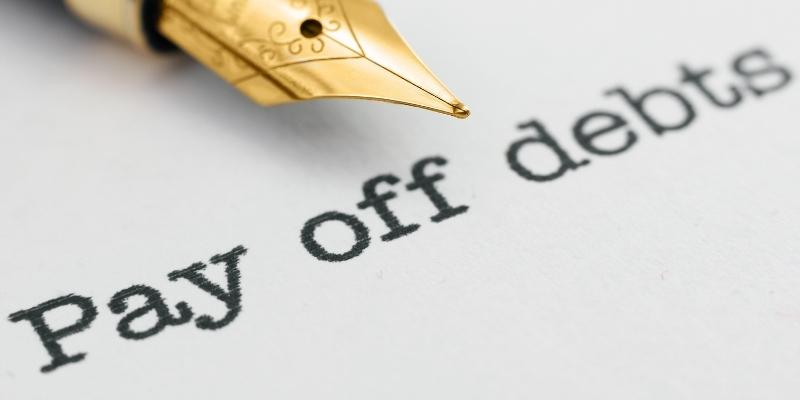How To Pay Off A Debt In Collection: A Complete Guide
Feb 27, 2024 By Susan Kelly
It's a terrifying time when debt collectors show up, especially if you've never dealt with them. You've heard the warnings about how your credit score will drop, you'll get calls from bill collectors, and your credit record will be marked negatively.
Debt collection is an issue that requires careful handling. Despite all that, there are still things you may do to eliminate your debt. Fortunately, some methods have been shown to work well when dealing with debt collection.

What Does Debt Collection Mean?
An account that has fallen into arrears and is now being pursued by a debt collection firm is called a debt collection. The primary purpose of collection agencies is to recuperate financial losses sustained by businesses you incurred the debt with.
Collectors of consumer debt often get a commission on amounts collected. Falling behind on practically every monthly commitment may lead to a collection. It covers credit card, vehicle, student, medical, utility, and library penalties.
Methods For Paying Off Debts
To settle debts, consider the following options:
- Put down the whole sum. You should do it immediately if you can afford to pay what you owe.
- You may use your pro rata plan to negotiate a payment schedule. Explain that you can make a regular payment and provide proof.
- Inquire about settling your bill. You may have as much as half of your debt forgiven with your request. Be prepared to pay the agreed-upon sum immediately if they bite.
How To Make Payments On A Debt In Collections
Please read the following to settle a debt that has been turned over to collections.
Verify Your Ownership Of The Debt
Never pay off a debt with a debt collector unless you've confirmed the debt is indeed yours. Verify your records and get in touch with the original debtor to confirm that you are dealing with the proper collection agency and that the reported amount is accurate. It is important to verify that the debt is indeed your obligation since mistakes do occur.
Verify Your State's Statute Of Limitations
There is a time restriction on how long a debt may be pursued legally in each state, known as the "statute of limitations." However, contacting the collection agency or making a partial payment might revive the debt in certain places.
You should verify your state's laws and ensure the debt hasn't been released via bankruptcy or other methods before proceeding.
Understand Your Debt Collection Rights
Debt collection agencies have restrictions on how they may contact you based on the FDCPA. They can't phone you between 9 p.m. and 8 a.m., can't call you at work if you've asked them not to, and can't inform anybody else, like a colleague, about your debt. They cannot intimidate, threaten, or verbally assault you either.
You may refer a debt collector to the FDCPA if you believe they are acting illegally. You may contact the CFPB at their toll-free number, 855-411-2372, or their website, consumerfinance.gov.
Determine Your Budget And Stick To It
To determine how much you can afford toward debt repayment, you need first look at your current financial situation. Analyze your spending patterns and budget to see how much of your monthly income you can put toward debt reduction or settlement by removing luxuries like cable or streaming services.
Request The Deletion Of Your Account
If you have the means, you may request that the collection agency remove the debt from your credit report in exchange for a single big payment. You may ask the debt collector to label the account as "paid in full" if they refuse to do so.
Your credit score will rise with any of these modifications, making it more likely that you will be approved for a new loan. It's worth asking, but not all collecting agencies will agree.
Prepare A Payment Schedule
Contact the collector for a payment plan if you can't pay in full. The number of installments necessary to write off the debt is a number you and the creditor will have to agree upon. It's possible to settle medical debt with your provider without paying interest.
First, contact the billing department and inquire about any programs to help you pay off or lower the debt. After that, inquire about your potential repayment plans. Ask to talk to a manager if you're having trouble receiving answers.
Submit Payment
After signing a formal agreement to settle the debt, you will send money to the debt collector. Sending a cheque to a debt collection agency through certified mail with a return receipt requested is the safest option.
It will serve as evidence that the collecting agency accepted the cheque. A postal receipt costs $3.05, whereas an electronic receipt costs $1.85. You should save these receipts if the collection agency disputes your payment.
Always Keep Records
When dealing with debt collectors, borrowers must be very careful to keep accurate records. Keep track of the collection agency's name, phone number, and conversation topic as soon as possible.
Make sure you have a written copy of any settlement terms before signing off. Even if they agreed to erase the account from your credit report orally, you might have difficulty persuading a credit bureau to comply without a formal agreement.
Conclusion
It takes time and effort to settle collection debts. If you can't pay off a collection bill on your own, seek a debt consolidation loan if you have good credit or a co-signer. While this won't remove your debt, it might reduce your interest rate and make paying it off easier. Regardless of settling your debt, checking the amount owed and collecting the necessary documentation is in your best interest.

Know-how
What Chiropractic Care Does Medicare Cover?
Medicare will pay for some types of chiropractic therapy in certain circumstances. Determine the circumstances in which you are protected and those in which you are on your own.
Learn More
Know-how
All About Medicare Cover Cataract Surgery
Medicare Advantage plans offer a wide range of coverage and prices for cataract surgery. Get in touch with a provider's customer support department for an estimate of costs before deciding to go through with the operation
Learn More
Taxes
Real Estate and Form 1099-A: Key Considerations for Property Owners
This article details the tax implications and reporting requirements of Form 1099-A in real estate transactions, particularly in cases of foreclosure and property abandonment.
Learn More
Know-how
Exploring the Key Features and Benefits of Money Metals Exchange
Explore how Money Metals Exchange excels in precious metals investment with competitive pricing, diverse offerings, and exceptional customer support.
Learn More
Banking
Should You Get an Axos Bank Personal Loan in 2024? Everything You Need to Know
Read our comprehensive review of Axos Bank personal loans for 2024, covering features, benefits, pricing, pros and cons, and whether it’s worth it for you
Learn More
Mortgages
Addendums in Real Estate
An extra condition or document added to an existing contract is an addendum—additional terms or documentation attached to an existing contract. Adding an addendum to the acquisition of real estate may be done for various reasons; however, it is important to note that this will not necessarily occur when you are purchasing a home or other property.
Learn More